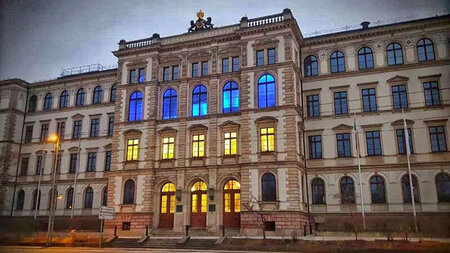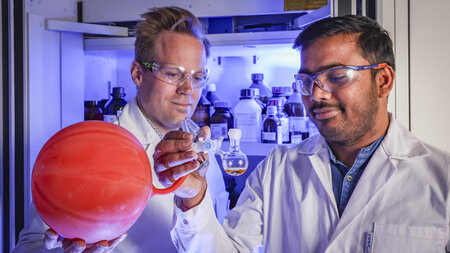More Efficient Power Electronics for Future Use in the Field of Renewable Energies
Subprojects completed by Chemnitz University of Technology within the joint project "Power2Power" funded by the EU, the federal government, and the states of Saxony and Thuringia achieved progress in improving the reliability and robustness of power semiconductors
 enlarge picture
enlarge picture -

Madhu Lakshman Mysore (left) and Xing Liu, research associates at the Professorship of Power Electronics at Chemnitz University of Technology and researchers in the "Power2Power" project, at the test stand where the robustness of power semiconductors can be investigated, including short-circuit behavior. Photo: Professorship of Power Electronics
Power semiconductors are used in many electrical applications – from small power to very high power. Due to this widespread use, increasing the efficiency and robustness of these components - for example, by reducing forward losses or increasing the short-circuit capability - has an enormous impact on the energy efficiency and durability of the respective application. This fact was the starting point for the joint project "Power2Power", which was funded by the European Union, the Federal Ministry of Education and Research, and the states of Saxony and Thuringia over a period of three years, and in which the Professorship of Power Electronics (Head: Prof. Dr. Thomas Basler) at Chemnitz University of Technology was also involved. The joint project with 43 partners was coordinated by Infineon. The project volume amounted to a total of around 74 million euros, of which around 528,000 euros were allocated to Chemnitz University of Technology.
The focus of the subprojects, addressed by the Professorship of Power Electronics at Chemnitz University of Technology, was on the research of reliability and robustness of power semiconductors. Specifically, this involved the improvement of "Insulated Gate Bipolar Transistors" (IGBT). These are transistors that are controlled via a small gate voltage and are essential for power electronics, for example for energy conversion in wind turbines or motor control in electromobility. As part of the joint project, the researchers from Chemnitz have succeeded in taking a significant step towards the production of intelligent power electronics for more energy-efficient applications.
"We have succeeded in gaining a much better understanding of the physical processes in the short-circuit mode of IGBTs. As a result, we were able to present an improved control concept that counteracts possible destructions under very high load. In addition, we have precisely defined the general limits of the short-circuit safe-operating area," explains Thomas Basler. With these findings and developments, the IGBT can be better utilized in the application and the overall robustness of the system can be increased. The results of Prof. Basler's research group will be of particular importance in the field of renewable energies in the future, as highly efficient and robust IGBTs are a core element in these applications.
"In addition, applications in electromobility and traction, for example in high-speed trains and trams, also benefit," adds Basler. Especially in traction technology, reliability demands are very high, as they have to last up to 30 years. "Within the joint project, we were able to provide contributions for improved prediction of the power-cycling lifetime and develop design rules for optimized power module layouts," says Basler.
Publications (selection):
- M. L. Mysore, M. Alaluss, A. Maitra, T. Basler, R. Baburske, F.-J. Niedernostheide, and H.-J. Schulze. Inves- tigation of the short-circuit type II safe operating area of IGBTs. In 2022 24th European Conference on Power Electronics and Applications (EPE’22 ECCE Europe), pages P.1–P.10, Sep. 2022.
- X. Liu, E. Deng, H. Wang, C. Herrmann, T. Basler, and J. Lutz. Influence of lateral temperature gradients on the failure modes at power cycling. IEEE Transactions on Components, Packaging and Manufacturing Technology, 11(3):407–414, March 2021. ISSN 2156-3985. doi: 10.1109/TCPMT.2021.3058201.
For further information, please contact Prof. Dr. Thomas Basler, Professorship of Power Electronics, tel. +49 (0)371 531-37843, e-mail thomas.basler@etit.tu-chemnitz.de.
(Author: Matthias Fejes / Translation: Brent Benofsky)
Matthias Fejes
23.01.2023





